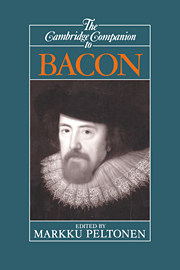Book contents
- Frontmatter
- Introduction
- 1 Bacon's idea of science
- 2 Bacon's classification of knowledge
- 3 Bacon's method of science
- 4 Bacon's forms and the maker's knowledge tradition
- 5 Bacon's speculative philosophy
- 6 Bacon as an advocate for cooperative scientific research
- 7 Bacon's science and religion
- 8 Bacon and rhetoric
- 9 Bacon and history
- 10 Bacon's moral philosophy
- 11 Bacon's political philosophy
- 12 Bacon's legacy
- Bibliography
- Index
7 - Bacon's science and religion
Published online by Cambridge University Press: 28 May 2006
- Frontmatter
- Introduction
- 1 Bacon's idea of science
- 2 Bacon's classification of knowledge
- 3 Bacon's method of science
- 4 Bacon's forms and the maker's knowledge tradition
- 5 Bacon's speculative philosophy
- 6 Bacon as an advocate for cooperative scientific research
- 7 Bacon's science and religion
- 8 Bacon and rhetoric
- 9 Bacon and history
- 10 Bacon's moral philosophy
- 11 Bacon's political philosophy
- 12 Bacon's legacy
- Bibliography
- Index
Summary
We must make therefore a complete solution and separation of nature, not indeed by fire, but by the mind, as if by a divine fire [tamquam ignem divinum]. (IV, 145; I, 257)
[It is an age] wherein, if science be increased, conscience is rather decayed; and if men's wits be great, their wills be more great. . . . (VII, 315)
THE SEPARATION OF SCIENCE AND RELIGION
A longstanding commonplace in Bacon scholarship has been the notion that the Baconian advancement of learning depends upon a strict separation of divinity and natural philosophy. In a number of memorable passages Bacon indeed warns his readers of the dire consequences of confusing divinity with natural science: to combine them, he says, is to confound them. This is supposedly what Plato and the scholastics did, and what Bacon explicitly designs the new learning to overcome. Even the acceptable hybrid “divine philosophy,” when it is “commixed together” with natural philosophy, leads to “an heretical religion, and an imaginary and fabulous philosophy” (111, 350). According to this emphatic strand of Baconian doctrine, religion that joins with the study of nature is in danger of becoming atheistic, or an enthusiastic rival of the true church. Natural philosophy that traffics unwisely with divinity collapses into idolatry or fakery.
- Type
- Chapter
- Information
- The Cambridge Companion to Bacon , pp. 172 - 199Publisher: Cambridge University PressPrint publication year: 1996
- 8
- Cited by

